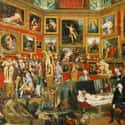-
(#12) The Long Depression Proves That Doing Things On Credit Is Never A Good Idea
In the early 1870s, things were good in America and the whole world over. While the country was still rebuilding from the Civil War, the economy was thriving, and an optimistic mood was infectious. Then, a fellow named Jay Cooke recommended financing railroad expansion on credit. After all, what could possibly be a safer bet than railroads?
When the scheme ultimately backfired, Cooke’s financial house was run out of business and caused a “run on banks,” which basically means a lot of customers withdrew their funds from the banks in a rapid fashion. Though the Treasury managed to ensure that everybody got their money, the damage was done, and consumer confidence was totally shot. The resulting decline in consumerism led to an economic slowdown that rippled across the world and lasted - depending on your metrics - until 1896.
-
(#4) Tulip Mania Almost Destroyed Holland... No, Really
In 1593, some enterprising flower peddler from Turkey introduced tulips to Holland, and the Dutch went absolutely crazy for the little flowers almost immediately. Unfortunately, the flow of tulips into the country was slow, which drove the price of the flower higher and higher.
Then, the Dutch tulips got the coolest disease ever: something known as mosaic, a non-threatening disease that turned the petals vibrant colors. This alteration only drove the price of tulips higher. It wasn’t long until people were doing everything they could - even cashing in their life savings and liquidating land - to get their hands on some tulip bulbs. As it turns out, tulip bulbs aren’t actually worth all that much, and most of the investments in tulips turned out to be (surprise!) basically worthless. The resulting depression made the Dutch resistant to the entire speculative investment game for decades to come.
-
(#7) The Economic Crisis Of The 14th Century Was Caused By A Royal Thirst For War
From about 1300 until 1450, the Church suffered from a decline in power in Europe and England. Thanks to increasingly warlike kings in France and England, the Church became a target for taxation and outright plunder. Even more, the kings of Europe levied incredibly high taxes on the people of their countries in an attempt to fund their need for constant warfare.
Though most of the skirmishes were tiny, the result was the centralization and then dissipation of most of Europe’s funds just so the richest people on the Continent could wage meaningless non-wars against one another. One of the major repercussions of this depletion of funds was the rise of sub-human living conditions that helped brew up the Black Death.
-
(#6) Though He Left Office With Record Approval, Reagan’s Early Years Were Tough On The Economy
From 1981 to 1982, the United States suffered through its worst economic depression since the big one of the 1930s. In spite of the country’s initial optimism that the new president, Ronald Reagan, would improve the economic situation, exactly the opposite proved to be true. Within 18 months of Reagan’s presidency, the country’s unemployment rate had risen to more than 10%.
In September of 1982, 54% of Americans said that Reagan’s economic policies had made their situation worse. Miraculously, though, the public’s opinion remained hopeful throughout the downturn and into the following years.
-
(#1) The Credit Crisis Of 1772 Was Caused Because Some Deadbeat Didn’t Want To Pay Back His Debts
In the 18th century, economic expansion was heavily reliant on investors’ and entrepreneurs’ ability to get credit for their projects. The stability of that credit was, in turn, heavily reliant on people's faith in banks. Cut to a Scottish banker jerk named Alexander Fordyce, who incurred a whole lot of debt and then decided not to repay it.
That became big news in London, because Fordyce was a partner in a huge banking firm in the city. When Fordyce ducked out to avoid his debtors, people lost their faith in the banks who were supposed to be, you know, reliable. The result saw a slow freeze of the European economy that seriously hindered the public’s faith in debt and credit.
Too bad it didn’t stick.
-
(#10) The Spanish Royal Family Proved That Financial Management And Inbreeding Do Not Mix
Though the Spanish treasury was riding high around 1600, with an estimated $3 trillion in plundered goods, by 1627, the whole thing had come crashing down. While the incredible lack of branches in the Spanish royal family’s tree (it looks that way because brothers married sisters) didn’t directly contribute to their financial ruin, it certainly helped.
What really did the job was the fact that Spain spent the late 1500s conquering a part of the planet that: a) didn’t want to be conquered, and b) outnumbered the Spanish soldiers by a lot. As a result of gaining their fortune through force, the Spanish government was forced to spend the money just as quickly to maintain control of their land. It didn’t work, and, as a result, Spain was forced to spend most of the 17th century groping in the dark and caring for mentally deficient monarchs.
New Random Displays Display All By Ranking
About This Tool
The stock market crash is one of the main signs of the world financial crisis. According to the recorded period of economic collapse in history, nine financial crises with huge scope and far-reaching impact have occurred on a global scale. Some major economic recessions will directly cause huge chaos in society and the economy and have a profound impact on future generations.
Economic collapse is often accompanied by a large number of business closures, a substantial increase in unemployment, and even severe social or political turmoil. The random tool introduced 14 important historical times about the economy that was on the verge of collapse.
Our data comes from Ranker, If you want to participate in the ranking of items displayed on this page, please click here.
















